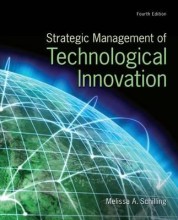Summary: Strategic Technology Management & Innovation
- This + 400k other summaries
- A unique study and practice tool
- Never study anything twice again
- Get the grades you hope for
- 100% sure, 100% understanding
Read the summary and the most important questions on Strategic Technology Management & Innovation
-
Introduction
This is a preview. There are 1 more flashcards available for chapter 11/04/2018
Show more cards here -
What are the five major elements of a strategy?
- Arenas: Where will we be active?
- Vehicles: How will we get there?
- Differentiators: How will we win in the market-place?
- Staging: What will be our speed and sequence of moves?
- Economic logic: How will we obtain our results?
-
What three key points of strategy does Hambrick (2001) mention?
- Strategies should be sound
- Strategies do not require the business to become rigid
- Strategies are not primarily about planning
-
Modularity
This is a preview. There are 4 more flashcards available for chapter 12/04/2018
Show more cards here -
What are the three forms of modular architecture according to Ulrich (1995)?
- Slot
- Bus
- Sectional
-
Explain the three types of inter-dependencies within product architectures.
- Pooled interdependence
- Sequential interdependence
- Reciprocal interdependence
-
What does Ulrich (1995) define as the three elements of a product architecture?
- Arrangement of functional elements
- Mapping functional elements to physical components
- Specification of interfaces (among interacting physical components)
-
Design rules clarify the interactions across the product's sub-systems. What four categories of design information do design rules include?
- Product architecture
- Interfaces
- Integration protocols
- Evaluation standards
-
How are the negative effects of design rules on architectural innovation mitigated?
By selecting appropriate innovation network partners and the right degree of organisational coupling (closeness and reciprocity).
The looser the organisational coupling, the less the negative impact of design rules. -
Baldwin & Clark (2003) state: "Modularity can be achieved by partitioning info into .....?"What do they state about the two main strategies within a modular marketplace?
"Visible design rules and hidden design parameters."
Companies can act as an architect, creating visible design rules for a modular product, or as a designer, desigining modules that conform to the architecture, interfaces and test protocols of others. -
Describe the terms product family and product platform.
Product family: A group of related products that is derived from a product platform to satisfy a variety of market niches.
Product platform: A set of common components, modules, or parts from which a stream of derivative products can be efficiently developed and launched. -
Technology Roadmapping
This is a preview. There are 5 more flashcards available for chapter 13/04/2018
Show more cards here -
What are the three layers of technology roadmapping?
- The 'Why'-layer: The markets that are being served in the future
- The 'What'-layer: Which products and services are offered in these markets
- The 'How'-layer: Which capabilities/technologies are necessary to offer these products & services
- Higher grades + faster learning
- Never study anything twice
- 100% sure, 100% understanding
































